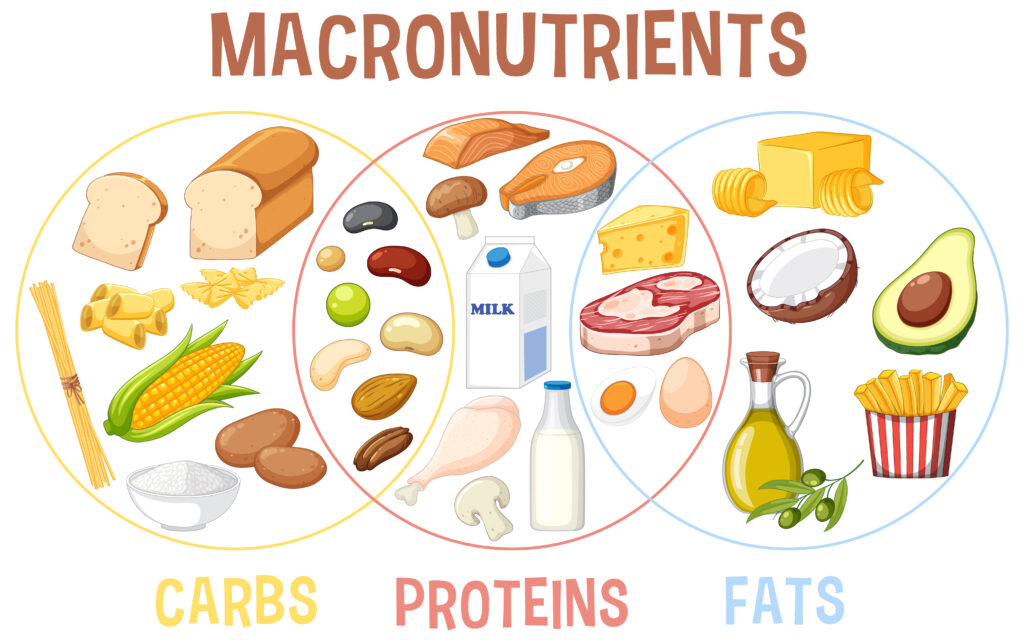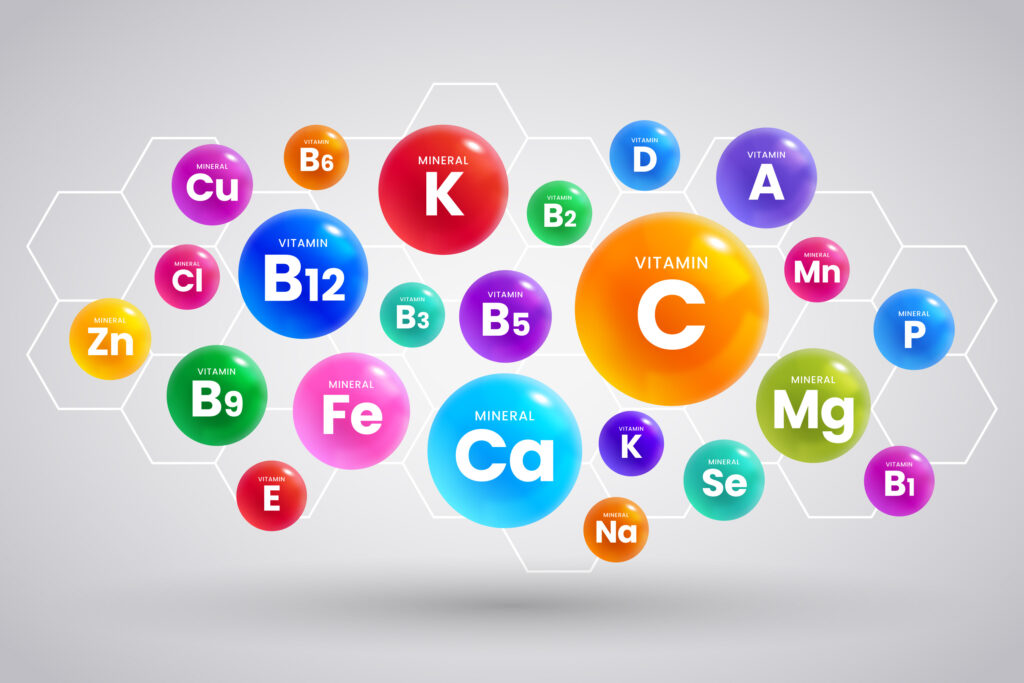Nutrition is the cornerstone of a healthy lifestyle. It encompasses the intake of food and its utilization by the body for growth, repair, and energy. Understanding nutrition is essential for maintaining optimal health and well-being.
Table of Contents
ToggleWhat is Nutrition?
Nutrition refers to the process by which organisms obtain and utilize nutrients for sustenance and growth. It involves the intake of food, digestion, absorption, metabolism, and excretion of waste products.
Nutrition plays a crucial role in every aspect of human health, from physical growth and development to mental function and disease prevention. A balanced diet provides the essential nutrients required for optimal body function and overall well-being.
Nutrition impacts various aspects of health, including immune function, cognitive function, energy levels, and longevity. A poor diet can lead to nutrient deficiencies, chronic diseases, and decreased quality of life.
Balanced Diet
A balanced diet provides the body with all the essential nutrients it needs to function optimally. Here’s what constitutes a balanced diet, the importance of variety, and strategies for achieving it:
What Constitutes a Balanced Diet?
Macronutrients: A balanced diet includes adequate amounts of carbohydrates, proteins, and fats. Carbohydrates are the body’s primary source of energy, while proteins are essential for tissue repair and muscle growth. Fats play roles in hormone production, cell structure, and nutrient absorption.
Micronutrients: A balanced diet also provides essential vitamins and minerals, such as vitamins A, C, D, E, K, and minerals like calcium, iron, magnesium, and potassium. These micronutrients are vital for various physiological functions, including immune function, bone health, and metabolism.
Fiber: Fiber is important for digestive health and regular bowel movements. A balanced diet includes sources of both soluble and insoluble fiber, found in foods like fruits, vegetables, whole grains, and legumes.
Hydration: Water is essential for hydration and supports various bodily functions, as discussed earlier.
Importance of Variety in Diet:
Eating a variety of foods ensures that you obtain a wide range of nutrients necessary for good health. Each food group provides different nutrients, so incorporating a variety of foods into your diet helps prevent nutrient deficiencies and promotes overall well-being.
Additionally, eating a diverse range of foods makes meals more enjoyable and satisfying, preventing boredom and monotony in your diet.
Strategies for Achieving a Balanced Diet:
Include a Variety of Foods: Aim to consume foods from all food groups, including fruits, vegetables, whole grains, lean proteins, and healthy fats. Experiment with different types of cuisines and recipes to incorporate diverse flavors and nutrients into your meals.
Portion Control: Pay attention to portion sizes to avoid overeating and ensure you’re getting the right balance of nutrients. Use smaller plates, bowls, and utensils to help control portion sizes and prevent excessive calorie intake.
Plan Meals Ahead: Plan your meals in advance to ensure they’re balanced and nutritious. Include a variety of foods from different food groups in each meal to meet your nutritional needs.
Read Food Labels: When shopping for packaged foods, read food labels to understand their nutritional content. Look for products that are low in added sugars, saturated fats, and sodium, and high in essential nutrients like fiber, vitamins, and minerals.
Limit Processed Foods: Minimize the consumption of processed and packaged foods, which tend to be high in unhealthy fats, sugars, and additives. Instead, focus on whole, minimally processed foods that are nutrient-dense and support overall health.

1. Macronutrients
- Carbohydrates: Carbohydrates are the body’s primary source of energy. They are found in foods such as grains, fruits, vegetables, and legumes. Carbohydrates are classified as simple or complex, depending on their chemical structure.
- Proteins: Proteins are essential for tissue repair, growth, and maintenance. They are made up of amino acids, which are the building blocks of life. Good sources of protein include meat, poultry, fish, eggs, dairy products, nuts, and seeds.
- Fats: Fats are important for energy storage, insulation, and cell membrane structure. They are categorized as saturated, unsaturated, or trans fats based on their chemical composition. Healthy sources of fats include avocados, olive oil, nuts, and fatty fish.
Functions of Macronutrients in the Body
- Energy Source: Carbohydrates and fats are the body’s primary sources of energy. They provide the fuel needed for physical activity, metabolism, and cellular function.
- Tissue Repair and Growth: Proteins play a vital role in repairing damaged tissues and building new cells. They are essential for muscle growth, immune function, and hormone production.
- Hormone Regulation: Fats are involved in the synthesis of hormones, including steroid hormones and prostaglandins. Hormones regulate various physiological processes, such as metabolism, growth, and reproduction.

2. Micronutrients
Micronutrients are essential nutrients required by the body in small amounts to support various physiological functions. They primarily include vitamins and minerals.
Vitamins: These are organic compounds necessary for the proper functioning of the body. Vitamins are classified into two groups: fat-soluble (such as vitamins A, D, E, and K) and water-soluble (such as vitamins B and C). Each vitamin plays a specific role in bodily functions, including energy production, cell repair, and immune system support.
Minerals: These are inorganic elements critical for bodily functions. Common minerals include calcium, iron, magnesium, zinc, and potassium. They are involved in processes like bone formation, oxygen transport, nerve function, and fluid balance.
Importance of Micronutrients:
Supporting Metabolism: Micronutrients play vital roles as cofactors in enzymatic reactions involved in metabolism. For instance, B vitamins are crucial for converting food into energy, while minerals like magnesium and zinc are involved in hundreds of metabolic reactions.
Enhancing Immunity: Micronutrients are essential for a robust immune system. Vitamins like C and D help maintain the integrity of the immune system, supporting its ability to defend against pathogens and infections. Minerals like zinc and selenium are also vital for immune function.
Preventing Deficiency Diseases: Micronutrient deficiencies can lead to various health issues known as deficiency diseases. For example, a lack of vitamin C can cause scurvy, while inadequate vitamin D can lead to conditions like rickets. Minerals deficiencies, such as iron deficiency, can result in anemia. Consuming a balanced diet rich in micronutrients helps prevent these deficiencies.
Micronutrients, including vitamins and minerals, are indispensable for overall health and well-being. They support metabolism, boost immunity, and prevent deficiency diseases, highlighting the importance of maintaining a diet that provides adequate amounts of these essential nutrients.

3. Water
Water is a fundamental component of human physiology, playing vital roles in various bodily functions. Here’s a breakdown of its significance and functions:
Significance of Hydration: Proper hydration is crucial for maintaining overall health and well-being. It ensures the optimal functioning of bodily systems and helps prevent dehydration, which can lead to fatigue, impaired cognitive function, and other health issues.
Functions of Water in the Body:
Regulation of Body Temperature: Water helps regulate body temperature through processes like sweating and evaporation. When the body overheats, sweat glands release water onto the skin’s surface, where it evaporates, dissipating heat and cooling the body.
Transportation of Nutrients: Water serves as a medium for transporting nutrients, such as glucose, amino acids, and minerals, throughout the body. These nutrients dissolve in water and are carried via the bloodstream to cells, where they are utilized for various metabolic processes.
Facilitation of Chemical Reactions: Many biochemical reactions in the body occur in aqueous environments, meaning they require water as a solvent. Water facilitates these reactions by providing a medium in which molecules can interact and react with each other.
Maintaining pH Balance: Water helps maintain the body’s pH balance by acting as a buffer, preventing sudden changes in acidity or alkalinity. This is essential for the proper functioning of enzymes and other proteins involved in metabolic processes.
Lubrication of Joints and Tissues: Water lubricates joints, allowing for smooth movement and reducing friction between bones. It also lubricates tissues, such as those in the eyes and mouth, helping maintain moisture and facilitating proper function.
Waste Removal: Water plays a crucial role in the excretion of waste products from the body. It helps flush out toxins and metabolic by-products through urine, sweat, and feces, aiding in the detoxification and cleansing of bodily systems.
Water is essential for numerous physiological processes, including temperature regulation, nutrient transport, waste removal, and maintaining overall hydration. Ensuring adequate water intake is crucial for optimal health and functioning of the body.
National Dietary Guidelines:-
National dietary guidelines are evidence-based recommendations provided by government agencies or health organizations to promote healthy eating habits and prevent nutrition-related diseases. These guidelines typically emphasize the importance of consuming a balanced diet that includes a variety of nutrient-dense foods in appropriate portions. They may also address specific dietary recommendations for various population groups, such as children, adults, pregnant women, and individuals with certain health conditions.
These guidelines often advocate for:
Balanced Diet: Encouraging the consumption of fruits, vegetables, whole grains, lean proteins, and healthy fats to ensure adequate intake of essential nutrients.
Moderation: Advising moderation in the consumption of foods high in added sugars, saturated fats, and sodium to reduce the risk of chronic diseases like obesity, diabetes, and heart disease.
Hydration: Emphasizing the importance of staying hydrated by drinking an adequate amount of water and limiting sugary beverages and excessive caffeine intake.
Physical Activity: Recommending regular physical activity as part of a healthy lifestyle to support overall health and well-being.
Examples of national dietary guidelines include the Dietary Guidelines for Americans issued by the U.S. Department of Agriculture (USDA) and the Department of Health and Human Services (HHS), as well as the Eatwell Guide in the United Kingdom and the Dietary Guidelines for Australians developed by the Australian Government.
Recommended Daily Intake:
Recommended daily intake refers to the recommended amounts of nutrients that individuals should consume each day to maintain optimal health. These recommendations are typically based on scientific research and are tailored to different age groups, genders, and life stages. Recommended daily intake values may vary depending on factors such as individual energy needs, activity levels, and specific health conditions.
Nutrients for which recommended daily intake values are commonly provided include:
- Macronutrients: Carbohydrates, proteins, fats
- Micronutrients: Vitamins (e.g., vitamin A, vitamin C, vitamin D) and minerals (e.g., calcium, iron, potassium)
- Fiber
- Water
These recommended intake values are usually expressed as Recommended Dietary Allowances (RDAs), Adequate Intakes (AIs), or Daily Values (DVs) and are intended to guide individuals in making informed food choices to meet their nutritional needs.
Tailoring Diet to Individual Needs:
Tailoring the diet to individual needs involves considering factors such as age, gender, activity level, health status, food preferences, cultural background, and dietary restrictions or allergies. It may also involve seeking guidance from healthcare professionals, such as registered dietitians or nutritionists, to develop personalized nutrition plans.
Some ways to tailor the diet to individual needs include:
- Assessing Nutritional Requirements: Understanding individual nutrient needs based on factors like age, gender, and activity level.
- Addressing Health Conditions: Modifying the diet to manage or prevent chronic diseases such as diabetes, hypertension, or food allergies.
- Accommodating Preferences: Adapting the diet to accommodate personal food preferences, cultural traditions, or ethical beliefs (e.g., vegetarianism, veganism).
- Monitoring Progress: Regularly assessing dietary intake and making adjustments as needed to ensure nutritional adequacy and support overall health and well-being.
By tailoring the diet to individual needs, individuals can optimize their nutrient intake, support their health goals, and establish sustainable eating habits that promote long-term wellness.
Impact of Nutrition on Health
The impact of nutrition on health is profound, with diet playing a crucial role in various aspects of well-being. Here’s how nutrition influences health, its role in disease prevention, and how it can help manage chronic conditions:
Connection Between Diet and Health:
Nutrient Intake: The foods we consume provide the essential nutrients needed for the proper functioning of the body. These nutrients include carbohydrates, proteins, fats, vitamins, minerals, and water. A balanced diet ensures that the body receives the necessary nutrients to support overall health and vitality.
Energy Balance: Nutrition plays a significant role in maintaining energy balance. Consuming an appropriate number of calories from nutrient-dense foods helps prevent both undernutrition and overnutrition, supporting healthy growth, development, and metabolism.
Gut Health: The gut microbiome, composed of trillions of microorganisms living in the digestive tract, is influenced by diet. A diet rich in fiber and plant-based foods promotes a healthy gut microbiome, which is associated with improved digestion, immune function, and mental health.
Inflammation: Certain dietary patterns, such as those high in processed foods, saturated fats, and sugars, can promote inflammation in the body, contributing to the development of chronic diseases like heart disease, diabetes, and certain cancers. Conversely, a diet rich in fruits, vegetables, whole grains, and healthy fats has anti-inflammatory properties and may lower the risk of inflammatory conditions.
Role of Nutrition in Disease Prevention:
Heart Disease: A diet high in saturated fats, trans fats, and cholesterol is a major risk factor for heart disease. Conversely, a diet rich in fruits, vegetables, whole grains, lean proteins, and healthy fats, such as those found in fish, nuts, and olive oil, can help prevent heart disease by lowering cholesterol levels, reducing inflammation, and supporting cardiovascular health.
Type 2 Diabetes: Poor dietary habits, including excessive consumption of sugary beverages, refined carbohydrates, and unhealthy fats, are linked to an increased risk of type 2 diabetes. Adopting a balanced diet that emphasizes whole, nutrient-dense foods and limits added sugars and processed foods can help prevent and manage diabetes by stabilizing blood sugar levels and promoting insulin sensitivity.
Obesity: Nutrition plays a central role in obesity prevention and management. Consuming a diet high in fruits, vegetables, lean proteins, and fiber-rich foods, while moderating portion sizes and reducing consumption of high-calorie, low-nutrient foods, can support weight management efforts and reduce the risk of obesity-related complications.
Managing Chronic Conditions Through Nutrition:
Diabetes: For individuals with diabetes, managing blood sugar levels is crucial. This involves monitoring carbohydrate intake, choosing complex carbohydrates that are digested more slowly, and incorporating plenty of fiber-rich foods to help regulate blood sugar levels.
Hypertension: A diet low in sodium and high in potassium, such as the DASH (Dietary Approaches to Stop Hypertension) diet, has been shown to help lower blood pressure. This involves reducing processed foods and increasing intake of fruits, vegetables, whole grains, and lean proteins.
Inflammatory Conditions: Certain dietary patterns, such as the Mediterranean diet, have been associated with reduced inflammation and improved symptoms in conditions like rheumatoid arthritis and inflammatory bowel diseases. These diets emphasize anti-inflammatory foods such as fatty fish, olive oil, nuts, seeds, and colorful fruits and vegetables.
Nutrition and Mental Health
Nutrition plays a significant role in mental well-being, with diet affecting various aspects of brain function and mental health. Here’s how diet influences mental well-being, nutritional strategies for mental health, and addressing eating disorders through nutrition:
Influence of Diet on Mental Well-being:
Brain Function: The brain requires a constant supply of nutrients to function optimally. Nutrients such as omega-3 fatty acids, vitamins B6, B12, and folate, as well as minerals like iron and zinc, play key roles in neurotransmitter synthesis, nerve signal transmission, and overall brain health.
Mood Regulation: Certain nutrients have been linked to mood regulation and emotional well-being. For example, omega-3 fatty acids found in fatty fish like salmon and walnuts have been associated with reduced risk of depression and improved mood.
Gut-Brain Connection: Emerging research suggests a strong connection between the gut and the brain, known as the gut-brain axis. A healthy gut microbiome, influenced by diet, has been linked to improved mood, reduced anxiety, and better stress management.
Inflammation: Chronic inflammation in the body, often influenced by diet, has been implicated in the development of mental health disorders such as depression and anxiety. Consuming a diet high in anti-inflammatory foods, such as fruits, vegetables, whole grains, and healthy fats, may help mitigate inflammation and support mental well-being.
Nutritional Strategies for Mental Health:
Balanced Diet: Consuming a balanced diet rich in nutrient-dense foods supports overall mental health. Emphasize fruits, vegetables, whole grains, lean proteins, healthy fats, and sources of omega-3 fatty acids.
Hydration: Staying hydrated is essential for cognitive function and mood regulation. Aim to drink plenty of water throughout the day and limit consumption of sugary beverages and excessive caffeine, which can disrupt hydration levels and affect mental well-being.
Limit Processed Foods: Processed and ultra-processed foods high in refined sugars, unhealthy fats, and additives may negatively impact mental health. Opt for whole, minimally processed foods whenever possible to support brain health and mood stability.
Moderate Alcohol Consumption: Excessive alcohol consumption can impair cognitive function and mood regulation. If consuming alcohol, do so in moderation and be mindful of its effects on mental well-being.
Mindful Eating: Practicing mindful eating, which involves paying attention to hunger and fullness cues, savoring food, and eating with awareness, can promote a healthier relationship with food and improve mental well-being.
Addressing Eating Disorders Through Nutrition:
Eating disorders, such as anorexia nervosa, bulimia nervosa, and binge eating disorder, involve complex psychological and physical factors that require comprehensive treatment approaches. Nutrition plays a central role in the treatment and recovery process for individuals with eating disorders. Nutritional strategies may include:
Nutritional Counseling: Working with registered dietitians or nutritionists who specialize in eating disorders to develop personalized meal plans, address nutritional deficiencies, and establish healthy eating behaviors.
Meal Support: Providing structured meal support and guidance to help individuals with eating disorders establish regular eating patterns, overcome food-related fears and anxieties, and restore nutritional health.
Education and Psychoeducation: Providing education about nutrition and its role in overall health, as well as psychoeducation about the psychological and physiological effects of disordered eating behaviors.
Individualized Approach: Recognizing that each individual’s nutritional needs and challenges are unique, and tailoring treatment plans accordingly to address specific dietary preferences, medical conditions, and cultural factors.
In summary, nutrition plays a significant role in mental well-being, with diet influencing brain function, mood regulation, and the gut-brain connection. Adopting a balanced diet rich in nutrient-dense foods, staying hydrated, and practicing mindful eating can support mental health. For individuals with eating disorders, comprehensive treatment approaches that address both nutritional and psychological aspects are essential for recovery and long-term well-being.



